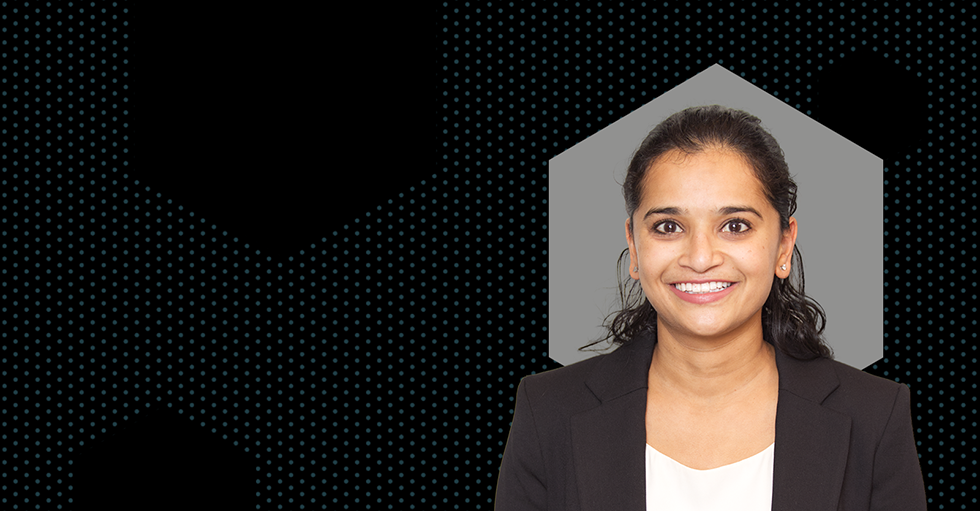Meet a Dragon: Usha Periyanayagam, MD, MPH

In the very first of our “Meet a Dragon” series, Senior Clinical Expert Usha Periyanayagam, MD, MPH, describes how her two professional roles dovetail to improve healthcare outcomes for the patients she sees -- and patients she never meets. She advises up-and-coming medical professionals with a special shout-out to women.
You work full-time at Komodo Health while still working part-time as an emergency room physician. How do your roles as a Senior Clinical Expert at Komodo Health and a practicing physician complement each other?
It’s incredibly rewarding to be able to impact healthcare at the individual level as well as the population level. Being an ER doctor puts me on the front lines working with the patients and seeing how the health system impacts them. I can see directly how gaps in data and knowledge affect an individual patient. As a doctor, I have the ability to make a difference in an individual patient's life. In the ER especially, people come in when they’re under stress, or when they have a potentially life-threatening illness. It is rewarding taking care of people and helping make their lives better.
But in an organization like Komodo Health, you get to make a difference in the entire population. You have the opportunity to help anybody in the United States who is being treated for a certain disease or has medical complications. I can be a stronger health tech professional because I understand the patient journey firsthand. I understand what the patient goes through to get the care they need, and how this impacts their lives. This experience is crucial to my ability to translate between data and healthcare, and break down silos in our system.
I find it valuable to have both perspectives. I still work in the ER; I still see patients. And I really enjoy taking that knowledge and applying it to the entire population. I enjoy using what we have at Komodo Health to make the entire U.S. lead happier, healthier lives.
Tell us about your role in Clinical Innovations.
The Clinical Innovations department is involved in a little bit of everything by providing medical perspective to the company. Part of my role is working with both current and future customers to understand their therapeutic areas and help define their cohorts. We understand their clinical needs and translate it into a question to be answered by Komodo Health’s data. Another role is working on our product strategy as Komodo Health develops new products and features to ensure our products are clinically relevant and compelling. I also use my background in epidemiology to help translate between data and healthcare to inform the general population about the current state of healthcare. This spans informing the lay public through media relations as well as medical professionals through research and medical literature.
We provide the clinical insight and oversight that comes from being medical professionals and understanding how hospitals and healthcare systems work.
What brings you the most satisfaction in your work?
There is so much innovation in medicine and pharma, but clinicians aren’t always up to date with the most recent studies and data. We support efforts to close gaps in knowledge and care that really help patients. We’ve helped medical affairs professionals reach physicians who hadn’t previously been able to access new therapies for their patients. We’ve helped get patients into clinical trials they couldn’t access - or didn’t even know existed. In some cases, a clinical trial is a second chance for a potentially life-altering treatment. I think that’s where I get the most joy.
What advice would you give to another medical professional starting in this field?
As a medical professional, you have a deep understanding of the healthcare system and the patient journey. My advice is to leverage this experience and find ways to enhance the product and address customer needs.
Work with teams who understand what you bring to the table and your value as a clinician. It’s beneficial for everyone. Companies that understand this, understand the healthcare system better and are far more likely to improve the system and patients’ lives.
Any specific advice for women?
Healthcare is still a very male-dominated industry, especially in leadership -- both in clinical practice as well as in tech. It’s important, especially for women, to have the confidence to know what you bring to the table, and insert yourself where you need to be heard. This is a skill I had to develop. It’s not always natural for me to reach out and say, “my voice needs to be heard.” I think once you do that and you get positive feedback, you develop more confidence. And the good news is there are a lot of organizations, like Komodo Health, that value our voices and understand that diverse perspectives lead to better products and increase our impact.
I also think it’s important to remember that “perfect” is not feasible, and it’s not something we should strive for or be proud of. This was best stated in a book called “Brave, Not Perfect” by Reshma Saujani, the founder and CEO of Girls Who Code. She wrote how women, specifically, are being raised to be perfect, when they really need to be brave and unafraid to fail.
What do you enjoy most about Komodo Health’s culture?
I like how open it is. You can ask anybody for help with problems or brainstorm different solutions, and there’s no judgment about “stupid” questions. I’ve had the ability to connect with people who’ve had an extremely different career path, and it’s been a lot of fun. I’ve also taken that opportunity to learn more about data, data science, and our capabilities. When you have a strong data science team, you have a resource you can dip into and learn more.
Can you tell us something that people may not know about you?
Before I was at Komodo Health, I was working in global health training and research at the Harvard Humanitarian Initiative. I was based at Brigham and Women’s Hospital in Boston, and one of my projects was teaching clinical skills and processes in a refugee camp in South Sudan. I was there in December, 2013 when the civil war unexpectedly started. I actually got evacuated by the U.S. Marines to Nairobi and had to find my way home from there. I was in rural South Sudan, trying to fly to Juba where the U.S. Marines could evacuate me. It was a volatile situation and it showed me I can keep cool under pressure. Six months later, I went to Pakistan to teach a mass casualty awareness course and the airport was attacked and bombed a few hours after I arrived. Fortunately I was safe, but I couldn’t get out for a couple of days. I don’t know if I’m chasing trouble or if trouble’s chasing me.
So far, my experience at Komodo Health has been a little less adventurous than my public health experiences overseas -- but incredibly rewarding nonetheless.
Our dragons are a diverse bunch! Co-workers hail from places as far-flung as Belfast and Mumbai to the American heartland. The uniqueness and diversity reflected in our people makes Komodo Health a stronger team, and we are all united around one common mission: to reduce the global burden of disease.
Our “Meet a Dragon,” series will introduce you to our brilliant, intellectually curious, humble, hard-working, and passionate “dragons” who embody our core values.







